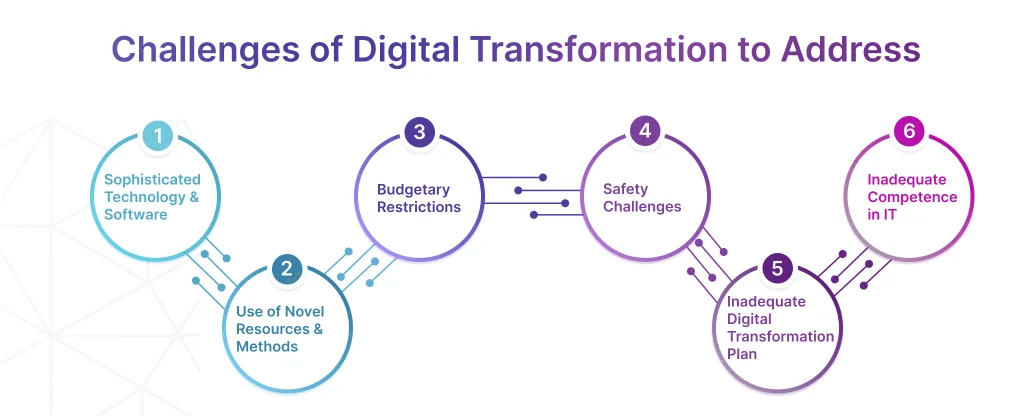business resources
The Role of Digital Transformation in Business Growth
11 Dec 2024, 1:50 am GMT
Digital transformation is the calling card of current management ideas, defining new business forms, customer interactions, and market competition. By using advanced technologies, organizations can improve the flow of operations, increase efficiency, and identify new sources of revenue. Today, it is imperative for organizations that want to be successful in a society with the growing importance of the internet. Embracing digital transformation means changing the operational model to meet new consumer needs and challenges. This process implies interweaving information technologies in all functional areas of an organization and relations with customers. While managing the dynamics of this change, organizations find new opportunities for optimizing their operations, creating value, and long-term development.
Understanding Digital Transformation
"Digital transformation does not only include new technologies in an organization’s processes; it is a novel approach to organizational performance and customer value creation. This entails questioning prior ways of working, using new techniques in practice, and endorsing organizational learning that encourages change. Therefore, with the right approach to the organization’s work, it will be possible to increase flexibility and survive in a highly competitive environment. The crux of the digital transformation concept can be summed up as the approach that technology needs to be used strategically to support organizational objectives." said Gemma Hughes, Global Marketing Manager at iGrafx. These include implementing the cloud strategy, automating existing processes, using data analysis, and similar key innovation initiatives to make organizational operations more efficient and effective. When these changes are recognized in companies, they open new prospects for development and progress as customer demands can be met.
Enhancing Operational Efficiency
"Increased process efficiency is one of the most critical advantages of digital transformation. Using robotics in performing repetitive activities and other hard-complicated tools can help businesses become more efficient with their body resources. This leads to the following benefits: It brings about efficiency, hence cutting expenses and increasing efficiency, thereby freeing the teams mentioned above to work towards strategic goals. Technologies such as ERP and CRM help reduce the information gap between departments to a large extent." added Adam Martin, Managing Director at Nova Acoustics. This scenario of operational architecture reduces existing silos and enables organizations to make decisions faster and respond to change in business environments.
Driving Innovation and Agility

"Acquisition of digital technology drives innovation since it creates a culture of creativity, making businesses look for what they can achieve. Adopting advanced technologies allows top management to try new products, services, and business models. This constant search for change is essential, mainly due to high and growing levels of market variability." says Gerrid Smith, Chief Marketing Officer at Joy Organics. Furthermore, digital transformation improves flexibility, as most organizations can adapt quickly to satisfy changing customer preferences and market trends. This means companies can easily change their strategies and thus create long-term sustainable plans.
Empowering Data-Driven Decision-Making
"Information is the centerpiece of digitalization, or, in other words, data is a key resource in the drive for increased sales. Technological advancement has allowed organizations to gather, sort, and interpret helpful information in strategic processes. This will enable organizations to make the right decisions regarding their goals by using data to drive their decisions. Analytics can help businesses achieve their goals by finding patterns and foretelling consumer actions and imperfections." adds Promise Okeke, CEO of NovoPath. Quantitative analysis helps organizations be more innovative and competitive, overcome existing challenges, and find new ways to grow.
Improving Collaboration and Communication
"Collaboration and communication are critical for organizations to succeed in their objectives. Digital transformation strategies can strengthen these. Remote cloud, video conferencing, and project management software make it easier for project team members to communicate regardless of distance. This means that various organizations need to integrate their work environment. This helps to establish collaboration and maintain harmony with the organizations’ objectives." commented Andy Fryer, Co-Founder of Easy Signs. This integrated system increases efficiency and fosters creativity, as team members can exchange information more readily.
Enhancing Customer Experience

Carl Panepinto, Marketing Director at Manhattan Flood Restoration, adds, "Customer experience as a strategic business construct has been identified as an essential determinant of business success, greatly enhanced by digital transformation. Companies can create closer client relationships by establishing more meaningful, efficient, direct, and multichannel communication. Using technological tools, an organization can assess customer needs and provide solutions. Technologies like chatbots, mobile apps, and social media pages guarantee customers easy business access." Engagement and satisfaction achieved from positive digital experiences promote customer loyalty and trust and ultimately buoy future sales, placing companies ahead in their industries.
Enabling Scalability and Global Reach
"Digital transformation helps amplify business impact and enables them to rapidly grow and enter new markets. Thus, concerns can globalize and meet diversified consumer demand through cloud computing, customer interface through e-commerce platforms, and various digital marketing techniques. Flexibility is essential for growth, and using digital tools can easily allow businesses to increase their capacity to respond to the demand likely to be occasioned by growth without compromising on quality." asserts Brett Gelfand, Managing Partner at Cannabiz Collects. This flexibility guarantees that organizations expand balanced while maintaining their ability to compete in the international market.
Overcoming Challenges of Digital Transformation

Dean Lee, Head of Marketing Manager at Sealions, shares, “Digital transformation has various potential impacts on business but also drawbacks. Some challenges include opposition to change, lack of technical prowess, and security threats. Meeting these needs demands a conceptual approach, training sessions, and commitment to the value of innovation. Thankfully, working through these challenges is possible by investing in the proper tools and resources for digital transformation. Proactive issue management helps organizations attain objectives and continue growth despite the current conditions of intense competition.”
Conclusion
It is worth stating that digital transformation is one of the key factors making businesses grow in the modern world. Organizations should work towards adopting and integrating new technologies into their operations to improve the outcomes of their operations, as well as transformation and customer satisfaction. This makes it easier for organizations to face new environmental challenges and cope with changes that make markets more digital. Consequently, the need to advance the status of digital transformation for companies as they progress will remain a crucial activity in the future. Those companies or firms that invest their time in this change and ensure they work around the challenges it is bound to present will be the ones that can maintain long-term sustainable growth and development with corresponding value for the customer and the investor.
Share this
Contributor
Staff
The team of expert contributors at Businessabc brings together a diverse range of insights and knowledge from various industries, including 4IR technologies like Artificial Intelligence, Digital Twin, Spatial Computing, Smart Cities, and from various aspects of businesses like policy, governance, cybersecurity, and innovation. Committed to delivering high-quality content, our contributors provide in-depth analysis, thought leadership, and the latest trends to keep our readers informed and ahead of the curve. Whether it's business strategy, technology, or market trends, the Businessabc Contributor team is dedicated to offering valuable perspectives that empower professionals and entrepreneurs alike.
previous
Why US Businesses Need Market Research Services Now More Than Ever
next
Steve Streit on Good Corporate Citizenship - 7 Guidelines